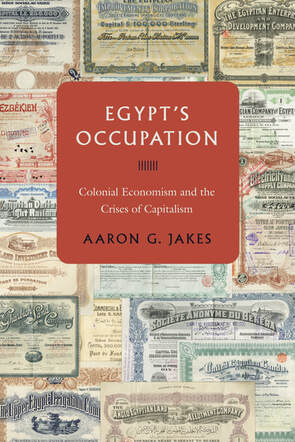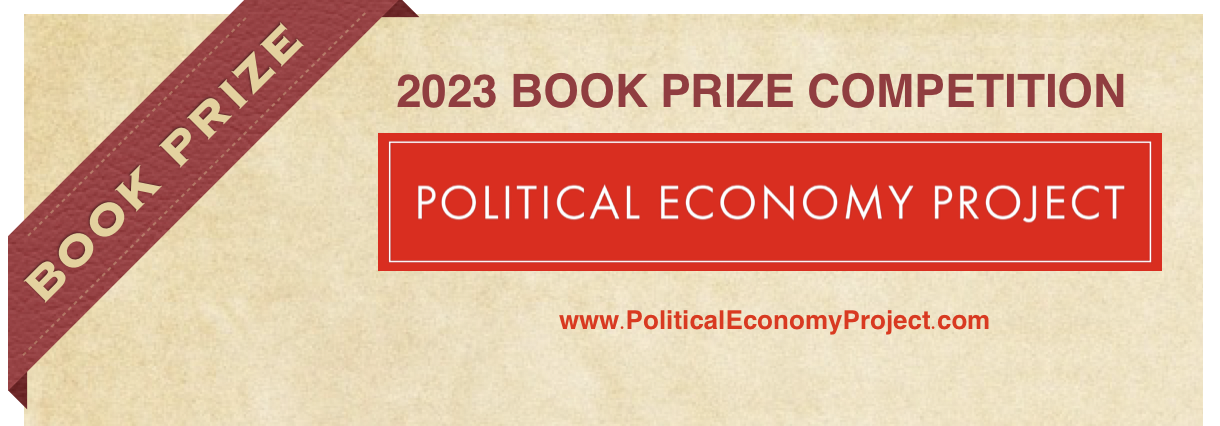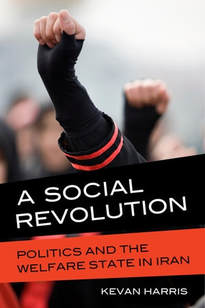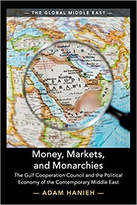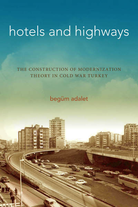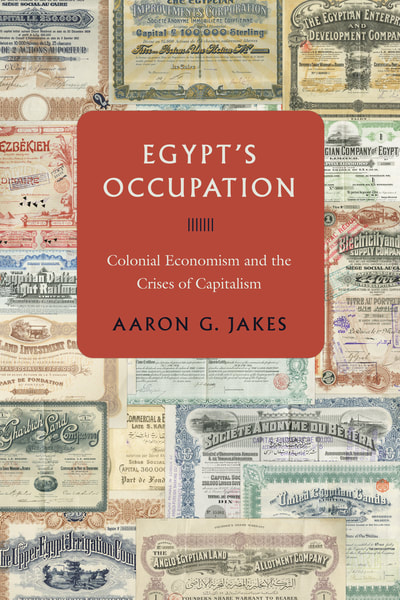Announcing the 2021 PEP Book Prize Winner
|
The Political Economy Project (PEP) is pleased to announce the winner of the 2021 PEP book prize, Egypt's Occupation: Colonial Economism and the Crises of Capitalism by Aaron G. Jakes. Read more about the award.
|
The Political Economy Project (PEP) is pleased to invite nominations for our 2023 Middle East Political Economy Book Prize. PEP aims to recognize and disseminate exceptional critical work on the political economy of the Middle East. While the book must have a political economy theme, we welcome nominations from across academic disciplines. Submissions will be read and judged by a committee drawn from PEP’s membership. Eligible texts must have been published in 2022 and can be either Arabic or English language. One book prize winner will be selected for each publication year. The book must make an original contribution to critical political economy research. The author(s) of the winning book will receive a prize of US$1000 and will be invited to give a talk at a PEP affiliated University. The author(s) will also be interviewed by the Arab Studies Institute’s Audio Magazine, Status/الوضع.
The deadline for submission is 30 June 2023
If you intend to participate, please fill out the submission form here. Submit any questions to: bookprize@politicaleconomyproject.org
Arab Studies Institute
4260 Chain Bridge Rd, Suite A6
Fairfax VA 22030
politicaleconomyproject.org
The deadline for submission is 30 June 2023
If you intend to participate, please fill out the submission form here. Submit any questions to: bookprize@politicaleconomyproject.org
Arab Studies Institute
4260 Chain Bridge Rd, Suite A6
Fairfax VA 22030
politicaleconomyproject.org
Previous PEP Book Prize Honorees
-
2018
-
2019
-
2021
<
>
The Political Economy Project (PEP) is pleased to announce the winner of the 2018 Middle East Political Economy Book Prize. With this prize, PEP aims to recognize and disseminate exceptional critical work on the political economy of the Middle East.
Kevan Harris's A Social Revolution: Politics and the Welfare State in Iran (University of California Press)
|
For decades, political observers and pundits have characterized the Islamic Republic of Iran as an ideologically rigid state on the verge of collapse, exclusively connected to a narrow social base. In A Social Revolution, Kevan Harris convincingly demonstrates how they are wrong. Previous studies ignore the forceful consequences of three decades of social change following the 1979 revolution. Today, more people in the country are connected to welfare and social policy institutions than to any other form of state organization. In fact, much of Iran’s current political turbulence is the result of the success of these social welfare programs, which have created newly educated and mobilized social classes advocating for change. Based on extensive fieldwork conducted in Iran, Harris shows how the revolutionary regime endured through the expansion of health, education, and aid programs that have both embedded the state in everyday life and empowered its challengers. This focus on the social policies of the Islamic Republic of Iran opens a new line of inquiry into the study of welfare states in countries where they are often overlooked or ignored.
|
Announcing the 2019 Middle East Political Economy Book Prize Winner and Honorable Mention
The Political Economy Project (PEP) is pleased to announce the results of the 2019 Middle East Political Economy Book Prize competition. With this prize, PEP aims to recognize and disseminate exceptional critical work on the political economy of the Middle East. This year marks the fourth annual award, and the selection committee reviewed nearly twenty nominations for a range of books dealing with political economy—representing a diversity of disciplines, topics, and geographic focus. The selection committee was particular impressed with two books in particular and consequently felt the need to recognize an honorable mention award.
The 2019 selection committee recognizes the following authors for their original contributions to critical political economy research:
The Political Economy Project (PEP) is pleased to announce the results of the 2019 Middle East Political Economy Book Prize competition. With this prize, PEP aims to recognize and disseminate exceptional critical work on the political economy of the Middle East. This year marks the fourth annual award, and the selection committee reviewed nearly twenty nominations for a range of books dealing with political economy—representing a diversity of disciplines, topics, and geographic focus. The selection committee was particular impressed with two books in particular and consequently felt the need to recognize an honorable mention award.
The 2019 selection committee recognizes the following authors for their original contributions to critical political economy research:
|
Winner
Adam Hanieh’s Money, Markets, and Monarchies: The Gulf Cooperation Council and the Political Economy of the Contemporary Middle East (Cambridge University Press) |
Honorable Mention
Begüm Adalet’s Hotels and Highways: The Construction of Modernization Theory in Cold War Turkey (Stanford University Press) |
The Political Economy Project (PEP) is pleased to announce the winner of the 2021 Middle East Political Economy Book Prize. With this prize, PEP aims to recognize and disseminate exceptional critical work on the political economy of the Middle East.
|
Egypt's Occupation Colonial Economism and the Crises of Capitalism by Aaron G. Jakes The history of capitalism in Egypt has long been synonymous with cotton cultivation and dependent development. From this perspective, the British occupation of 1882 merely sealed the country's fate as a vast plantation for European textile mills. All but obscured in such accounts, however, is Egypt's emergence as a colonial laboratory for financial investment and experimentation. Egypt's Occupation tells for the first time the story of that financial expansion and the devastating crises that followed. Aaron Jakes offers a sweeping reinterpretation of both the historical geography of capitalism in Egypt and the role of political-economic thought in the struggles that raged over the occupation. He traces the complex ramifications and the contested legacy of colonial economism, the animating theory of British imperial rule that held Egyptians to be capable of only a recognition of their own bare economic interests. Even as British officials claimed that "economic development" and the multiplication of new financial institutions would be crucial to the political legitimacy of the occupation, Egypt's early nationalists elaborated their own critical accounts of boom and bust. As Jakes shows, these Egyptian thinkers offered a set of sophisticated and troubling meditations on the deeper contradictions of capitalism and the very meaning of freedom in a capitalist world. |

